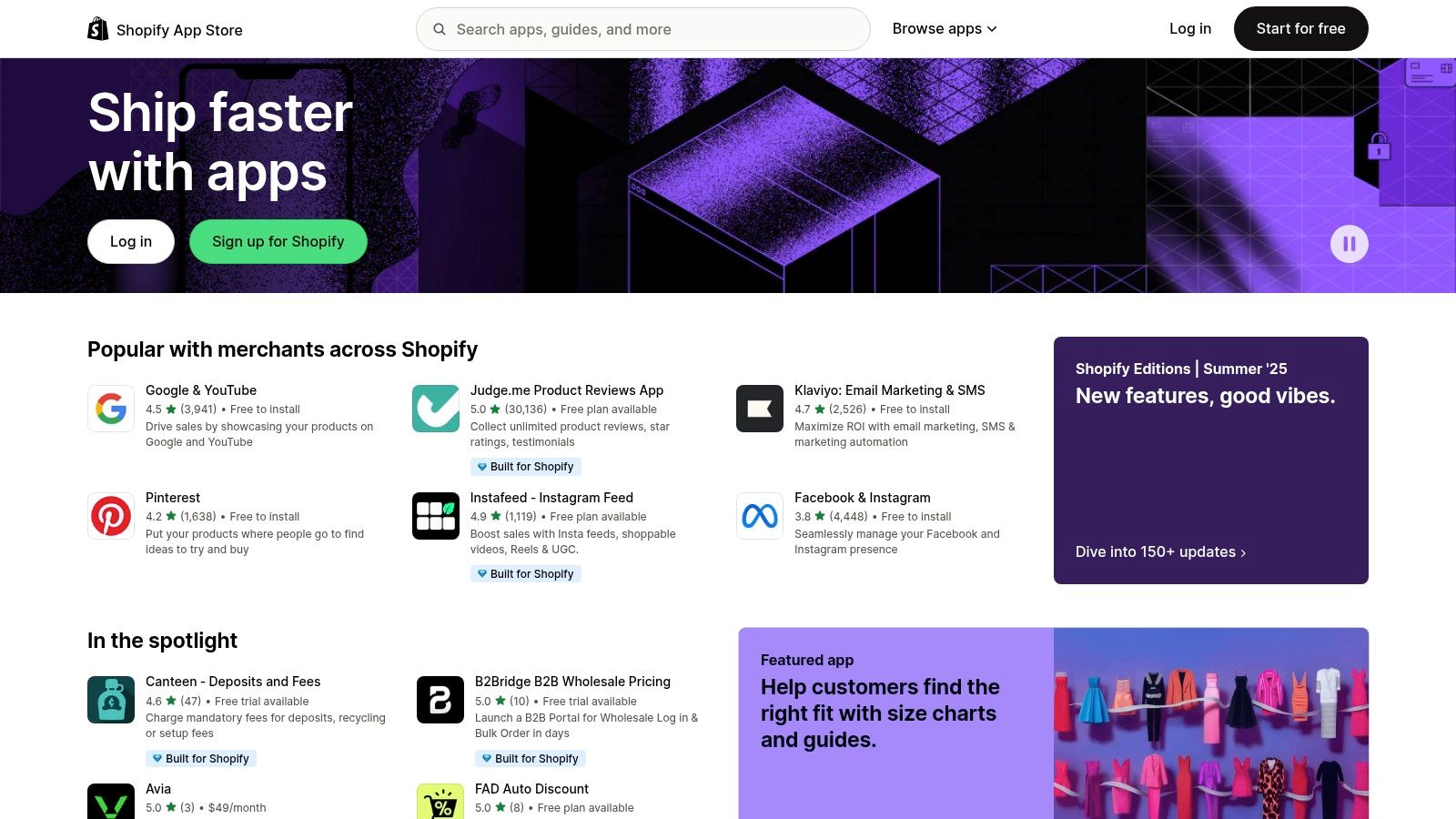Discover the top 12 AI tools for small business in 2025. Boost productivity and growth with our detailed review of features, pricing, and use cases.
Artificial intelligence has moved from a futuristic concept to a practical asset for businesses of all sizes. For small businesses, leveraging the right AI tools for small business can be a game-changer, automating tedious tasks, unlocking new marketing channels, and providing data-driven insights that were once reserved for enterprise-level corporations. The democratization of this technology means that powerful capabilities are no longer gated behind massive budgets or specialized engineering teams. This accessibility extends to various professional aspects, as illustrated by the growing use of AI in job search tools for individuals.
This guide cuts through the noise to provide a detailed, analytical look at the 12 most effective AI tools for small business owners, helping you choose the right technology to accelerate growth and streamline your operations. We move beyond generic feature lists to offer a critical assessment of each platform, focusing on practical use cases, implementation hurdles, and genuine limitations.
Each entry includes a direct link, pricing analysis, and screenshots to give you a clear, functional overview. Whether you need to generate technical documentation with a tool like DocuWriter.ai, automate customer support, or optimize marketing campaigns, this resource is designed to help you identify the specific platforms that will deliver a tangible return on investment. Let’s dive into the solutions that can help your business compete more effectively.
For small businesses, particularly those in the tech sector or with in-house development teams, DocuWriter.ai stands out as a transformative AI tool that tackles a critical, often-neglected aspect of software development: documentation. It automates the creation of comprehensive code and API documentation directly from source code, saving hundreds of developer hours and ensuring consistency across projects. This platform is a prime example of targeted AI tools for small business that solve a high-value problem with precision.
What makes DocuWriter.ai a featured choice is its expansion beyond simple documentation. It’s a full-suite development accelerator. Its intelligent code refactoring feature analyzes and suggests optimizations, enhancing code quality and maintainability. The platform can also generate UML diagrams to visualize software architecture and even perform code-to-code language conversion, a massive asset for teams working with multiple technologies. Furthermore, its AI-powered test suite generation automates a significant portion of the quality assurance process, helping teams catch bugs earlier and deploy with more confidence.
The platform integrates seamlessly with Git repositories, Postman, and n8n, fitting directly into existing development workflows. A significant advantage is its commitment to security; it processes your code without storing it or using it for AI model training, a crucial consideration for proprietary projects.
With flexible plans starting at just $19/year and educational discounts available, DocuWriter.ai provides enterprise-grade development automation at a price point accessible to any small business or freelancer.
**Ready to streamline your development process? **Try DocuWriter.ai today
OpenAI’s ChatGPT for Business elevates the familiar conversational AI into a secure, collaborative environment essential for small teams. While the free version is powerful, the Business tier provides critical administrative controls, a dedicated workspace for team members, and, most importantly, a guarantee that your business data will not be used to train OpenAI’s models. This makes it a viable and secure option among ai tools for small business concerned with data privacy.
The platform excels at rapid deployment. A small business can integrate it into workflows like content creation, customer service response drafting, or even market research analysis with minimal technical overhead. Access to advanced models like GPT-4 and tools like Advanced Data Analysis allows teams to process and visualize data directly within the chat interface, turning complex datasets into actionable insights.
However, the per-seat subscription model can become costly as a team grows, and its governance features are less comprehensive than full enterprise-level solutions. For developers in a small business, its API can be a powerful asset for building custom applications, from internal documentation bots to sophisticated code generation assistants.
For a deeper dive into using AI for development, explore how to leverage these tools for AI-powered code generation on docuwriter.ai.
Need to create exceptional technical documentation? Try DocuWriter.ai to generate comprehensive, clear, and consistent content for your software projects in minutes.
Microsoft 365 Copilot embeds powerful AI capabilities directly into the suite of applications that many small businesses already rely on daily. Instead of a standalone tool, Copilot functions as an integrated assistant within Word, Excel, PowerPoint, Outlook, and Teams. This deep integration allows users to draft documents, summarize email threads, generate presentations from outlines, and analyze data in spreadsheets using natural language prompts, significantly reducing the friction of adopting new ai tools for small business.
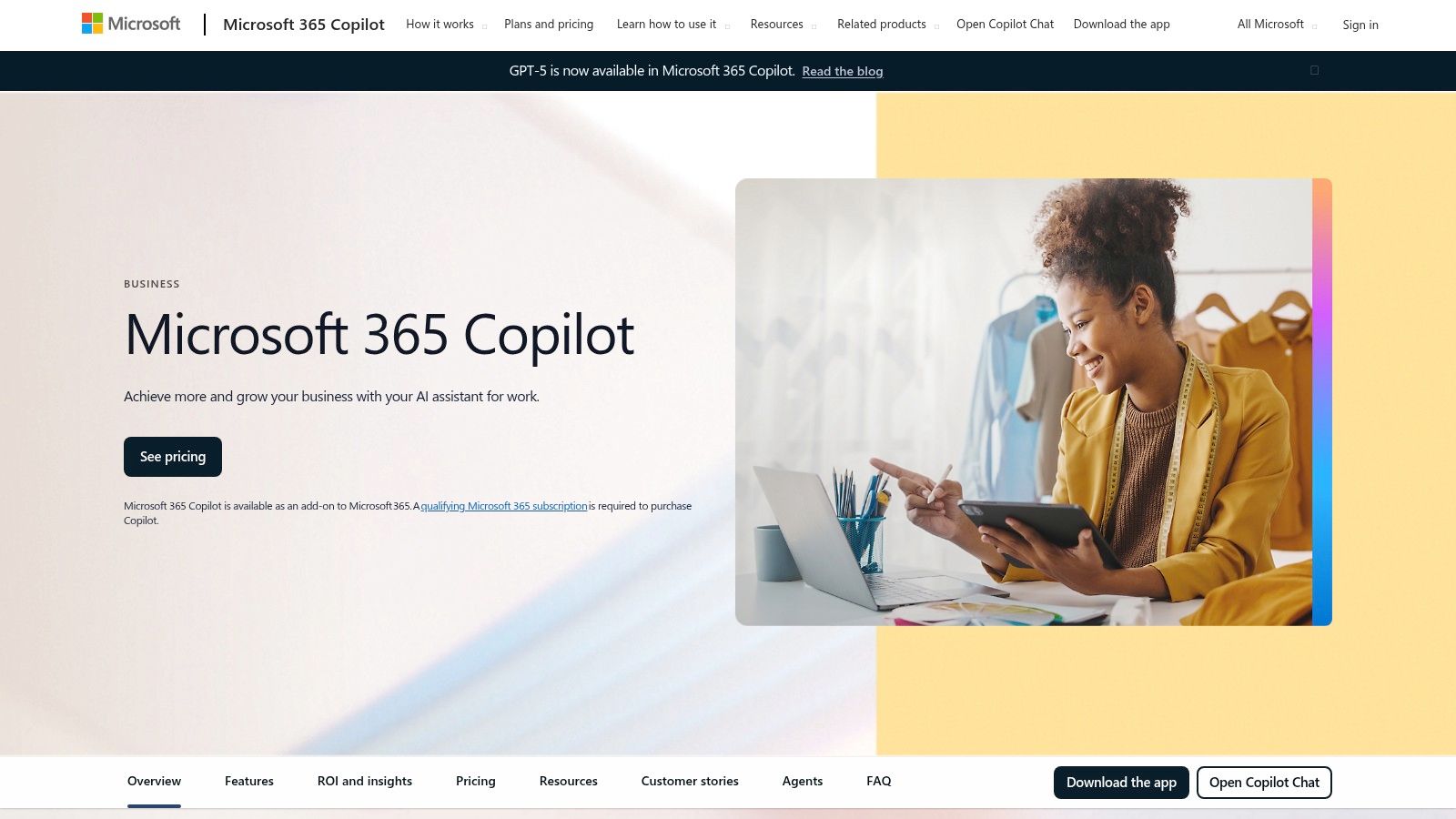
The platform’s key advantage is its connection to the Microsoft Graph, which allows it to pull context from your business’s documents, calendar, and communications to provide relevant, personalized assistance. For businesses already invested in the M365 ecosystem, this provides a secure, compliant way to leverage proprietary data without external exposure. All processing happens within the M365 trust boundary, addressing major security concerns.
However, access requires a qualifying M365 plan (like Business Standard or Premium), making it an add-on cost rather than a standalone purchase. There is currently no free trial for the Copilot add-on, so businesses must commit to the annual subscription to evaluate its full potential within their workflows. This makes the initial investment a significant consideration for smaller operations.
Need to create exceptional technical documentation? Try DocuWriter.ai to generate comprehensive, clear, and consistent content for your software projects in minutes.
For small businesses already embedded in the Google ecosystem, Gemini for Business is a natural extension that integrates generative AI directly into familiar applications. As a paid add-on to an existing Workspace plan, Gemini brings powerful assistance into Gmail, Docs, Sheets, and Meet, eliminating the need to switch contexts between different ai tools for small business. This seamless integration allows for immediate productivity gains, from drafting professional emails in Gmail to generating project plans in Sheets.
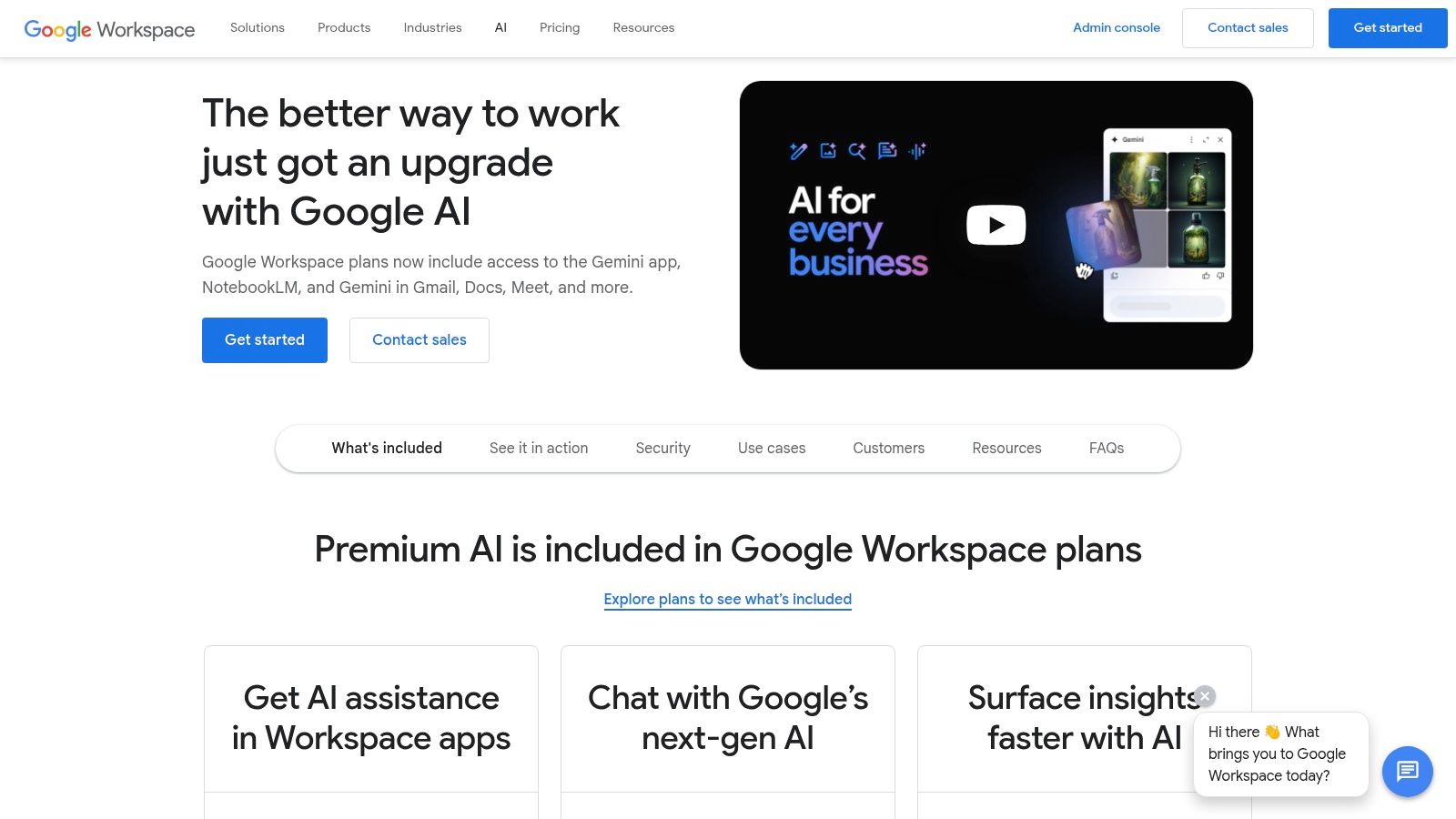
What sets it apart is the enterprise-grade data privacy promise. Google guarantees that your conversations and business data are not used for advertising or to train its models, addressing a major security concern for businesses handling sensitive information. The AI-powered features in Google Meet, such as real-time translated captions (on the Enterprise plan), are particularly beneficial for teams collaborating across language barriers.
However, its primary limitation is its dependence on an existing Google Workspace subscription, making it a non-starter for businesses using other productivity suites. Additionally, some of the most advanced features are locked behind the more expensive Enterprise add-on, which may be beyond the budget of smaller teams. The value proposition is strongest for teams seeking to enhance their current Google-centric workflows rather than adopting a standalone AI tool.
For a deeper dive into using AI for development, explore how to leverage these tools for AI-powered code generation on docuwriter.ai.
Need to create exceptional technical documentation? Try DocuWriter.ai to generate comprehensive, clear, and consistent content for your software projects in minutes.
Canva’s Magic Studio integrates a powerful suite of AI tools directly into its user-friendly design platform, making sophisticated content creation accessible to non-designers. For small businesses, this means the ability to generate marketing visuals, videos, presentations, and even ad copy without needing specialized skills or software. It’s a standout among ai tools for small business because it consolidates design and AI generation into a single, intuitive workflow.
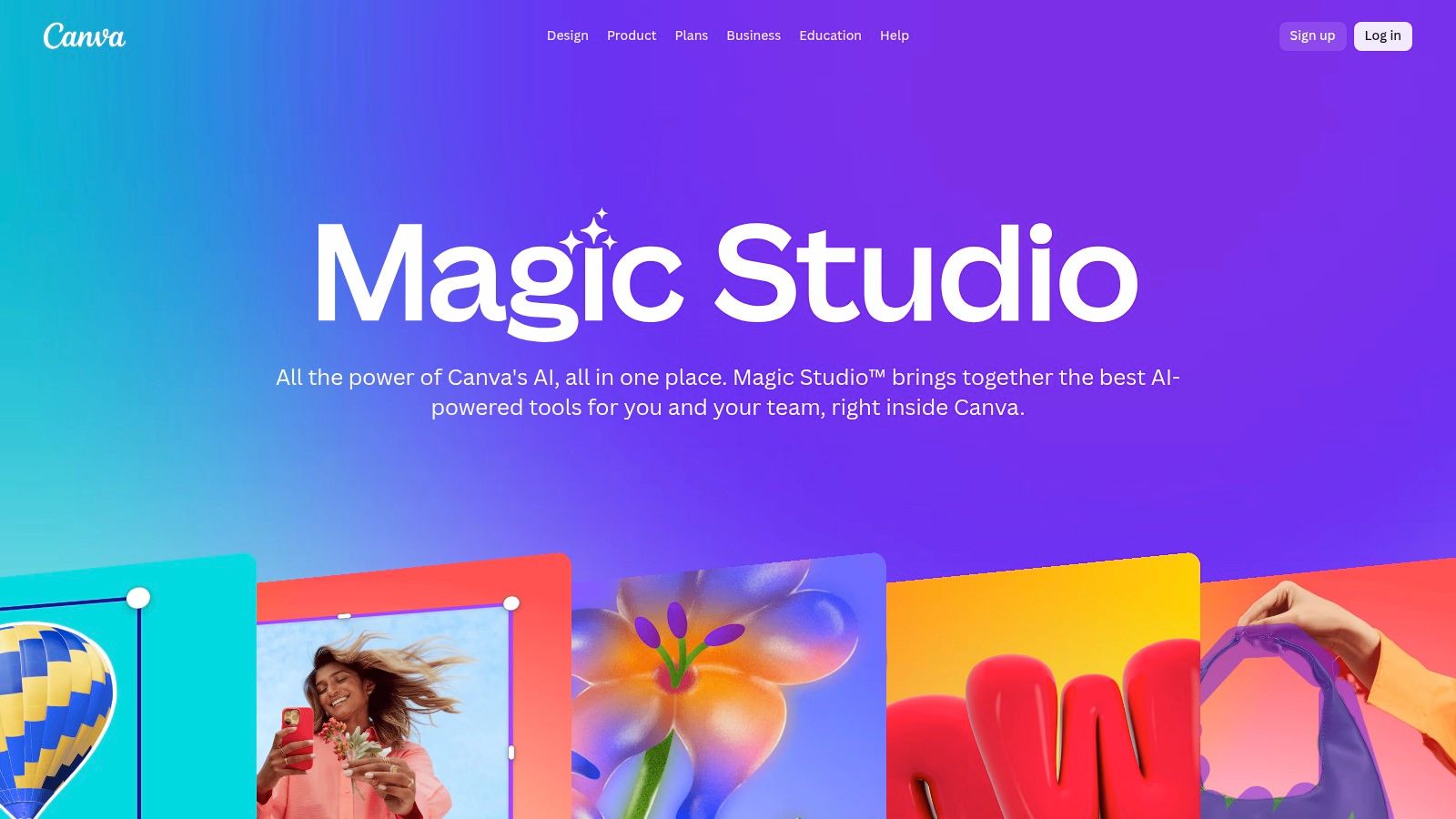
The platform’s strength lies in its practical application for scaling marketing efforts. Features like Magic Switch can transform a single design into multiple formats (e.g., a blog graphic into a social media post and a presentation slide) with one click, while text-to-image and text-to-video tools streamline asset creation. This drastically reduces the time and resources spent on producing branded content for various channels.
However, while some features are available on the free tier, the most impactful tools and higher usage limits are locked behind Canva Pro or Teams subscriptions. The platform also includes administrative controls and an opt-in policy for using business data for model training, giving teams control over their intellectual property.
Need to create exceptional technical documentation? Try DocuWriter.ai to generate comprehensive, clear, and consistent content for your software projects in minutes.
HubSpot’s Starter Customer Platform integrates AI directly into a comprehensive CRM, offering small businesses a unified solution for marketing, sales, and service. Unlike standalone AI tools, HubSpot embeds its AI features within existing workflows, allowing users to generate marketing emails, create social media copy, build reports, or summarize sales calls without leaving the platform. This makes it one of the most practical ai tools for small business looking to enhance productivity across their entire go-to-market strategy.
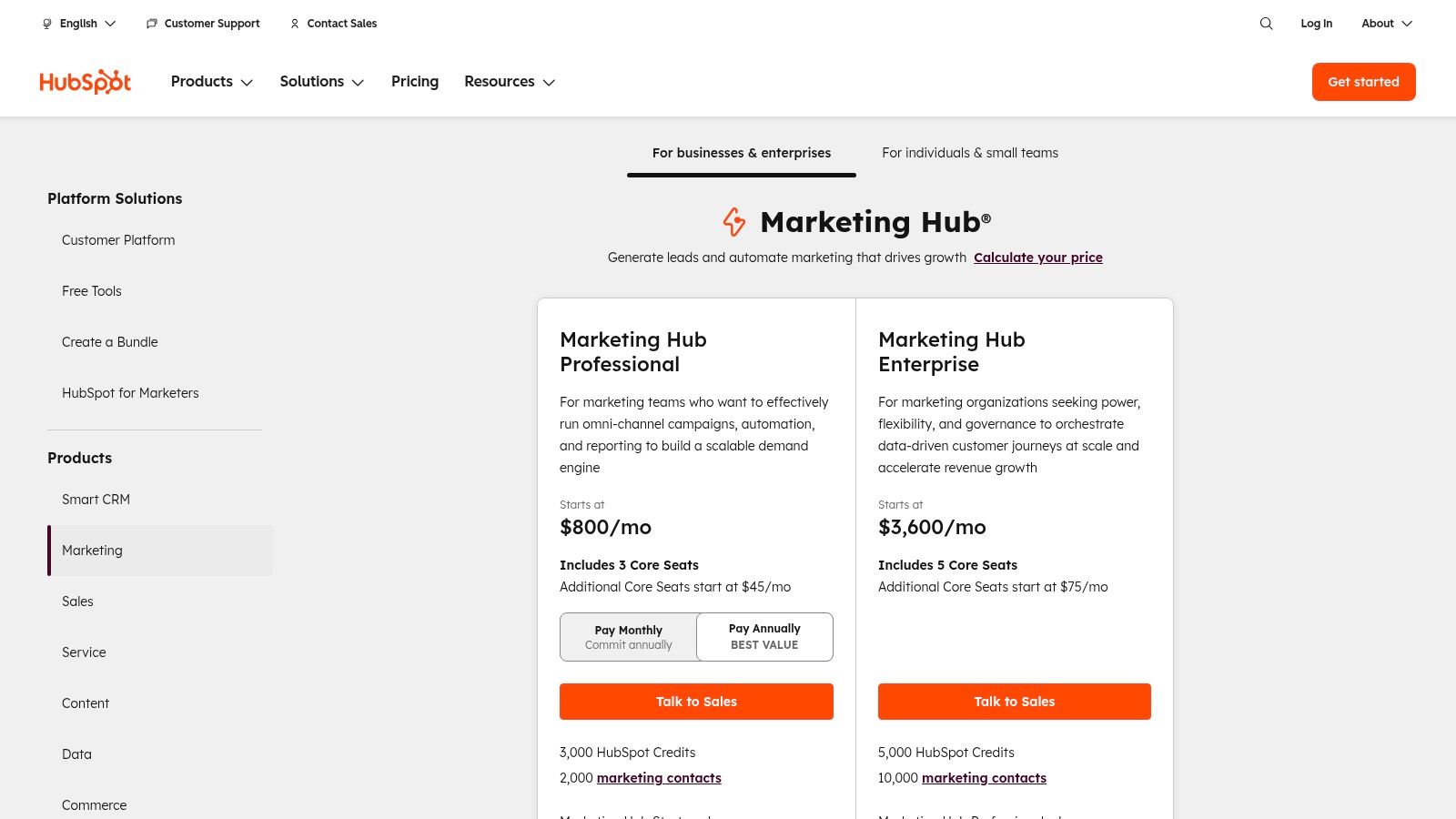
The platform is designed for scalability, enabling businesses to start with an affordable plan and expand as they grow. Its strength lies in its ecosystem; the extensive marketplace, robust educational content, and 24/7 support (even on Starter plans) significantly lower the barrier to adoption for non-technical teams. This integrated approach ensures that AI capabilities are accessible and immediately applicable to core business functions like lead nurturing and customer support.
However, the cost can escalate. While starter prices are attractive, they often increase after the initial promotional period, and pricing is tied to contact tiers and optional add-ons. For a small business, carefully managing contact lists and feature needs is crucial to control expenses. Despite this, its all-in-one nature provides immense value by consolidating a fragmented tech stack into a single, intelligent platform.
Need to create exceptional technical documentation? Try DocuWriter.ai to generate comprehensive, clear, and consistent content for your software projects in minutes.
Zapier has evolved from a simple integration tool into a powerful automation hub, making it one of the most practical ai tools for small business. It enables small businesses to connect over 7,000 applications and inject AI into their workflows without writing a single line of code. The platform now includes AI-powered agents and chatbots that can be trained on your specific data sources, allowing for custom automated responses and actions across your software stack.
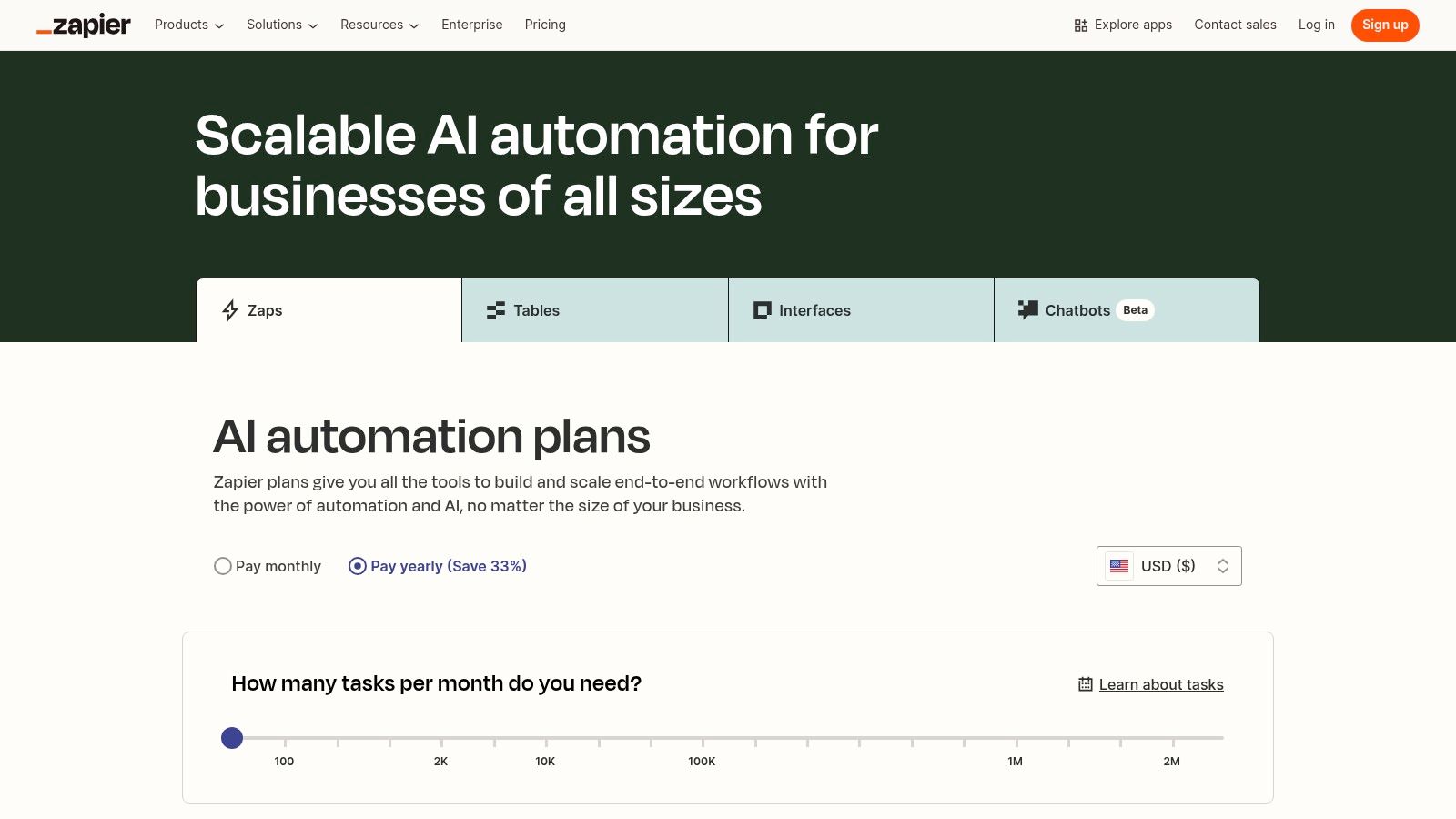
The visual workflow builder is where Zapier shines, offering a straightforward way to create multi-step automations called “Zaps.” A small business can, for example, build a Zap that automatically analyzes a new lead from a form, uses AI to categorize its urgency, and then sends a tailored follow-up email. This ability to create quick, tangible wins in workflow efficiency is its key advantage for resource-constrained teams.
However, its task-based pricing model can become a significant expense for businesses with high-volume automations. It’s crucial to monitor task usage to manage costs effectively. Additionally, while connecting apps is easy, ensuring data flows securely requires adherence to security best practices, which falls on the user to implement correctly.
For a deeper dive into using integration platforms for content workflows, explore how to set up automated document generation.
Need to create exceptional technical documentation? Try DocuWriter.ai to generate comprehensive, clear, and consistent content for your software projects in minutes.
Notion elevates the standard project management and documentation workspace by deeply integrating Notion AI, transforming a passive knowledge base into an active assistant. For small businesses, this means unifying project boards, documents, and company wikis in one place, while an AI layer helps summarize long meeting notes, draft content directly within a page, or autofill database tables based on custom prompts. This makes it an incredibly efficient choice among ai tools for small business looking to consolidate their software stack.
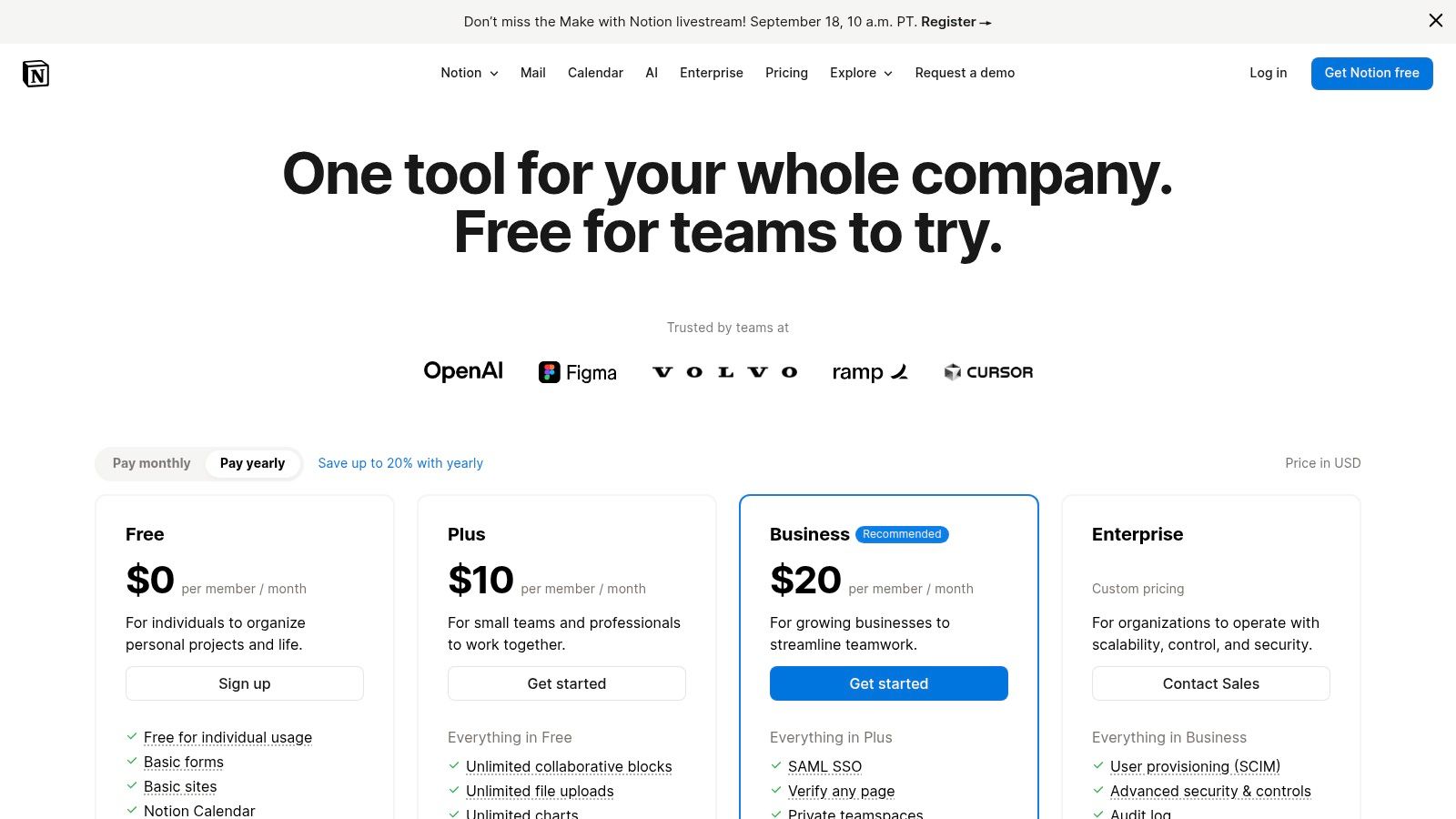
The platform’s strength lies in its contextual AI. Instead of switching to a separate tool, teams can highlight text and instantly ask the AI to improve writing, translate, or explain complex concepts. Its new Q&A feature can search the entire workspace to provide answers based on your company’s own data, effectively creating a custom chatbot for internal knowledge. This tight integration streamlines workflows, connecting disparate information and reducing context switching for technical and non-technical teams alike.
However, accessing the full suite of AI capabilities requires a paid add-on to the standard subscription plans, which can increase the total cost. Additionally, while its administrative controls are sufficient for most small teams, they are not as granular as dedicated enterprise-level project management systems.
For a deeper dive into using AI for development, explore how to leverage these tools for AI-powered code generation on docuwriter.ai.
Need to create exceptional technical documentation? Try DocuWriter.ai to generate comprehensive, clear, and consistent content for your software projects in minutes.
QuickBooks enhances its industry-standard accounting software with Intuit Assist, an AI-powered feature designed to streamline financial management for small businesses. By integrating generative AI directly into the accounting workflow, it automates tedious tasks like creating invoices from email text or receipt images. This functionality makes it one of the most practical ai tools for small business looking to reduce manual data entry and reclaim valuable time.
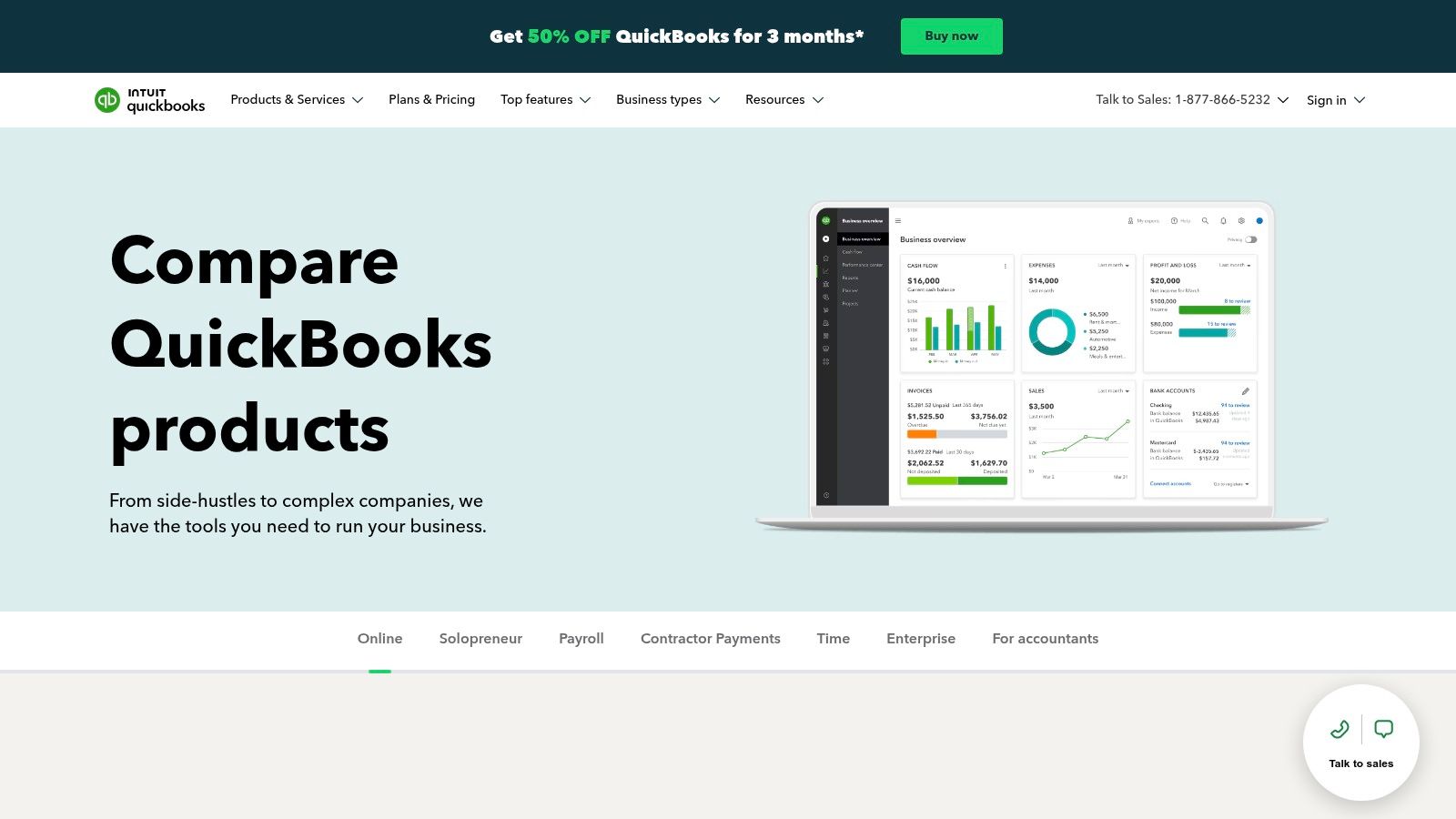
The system’s “Business Feed” provides AI-generated insights, flagging important trends or potential issues in cash flow without requiring users to manually run and interpret complex reports. It also automates tasks like sending payment reminders and categorizing expenses, learning from user behavior to improve accuracy over time. The AI operates within Intuit’s established data privacy principles, providing a layer of trust for sensitive financial information.
However, the availability of specific Intuit Assist features is tied to the QuickBooks Online subscription tier, which can be a drawback for businesses on lower-cost plans. Additionally, price increases for 2025 may impact its affordability. Despite this, its seamless integration with QuickBooks Payments and Bill Pay creates a powerful, end-to-end financial ecosystem that saves significant time.
Need to create exceptional technical documentation? Try DocuWriter.ai to generate comprehensive, clear, and consistent content for your software projects in minutes.
For small businesses running on Shopify, the platform’s App Store is a curated goldmine of specialized AI tools designed specifically for ecommerce. Instead of being a single tool, it’s an ecosystem where merchants can find AI-powered solutions for everything from personalized product recommendations and intelligent search to automated customer service chatbots and AI-driven content generation for product descriptions. This makes it an essential hub of ai tools for small business in the retail sector.
